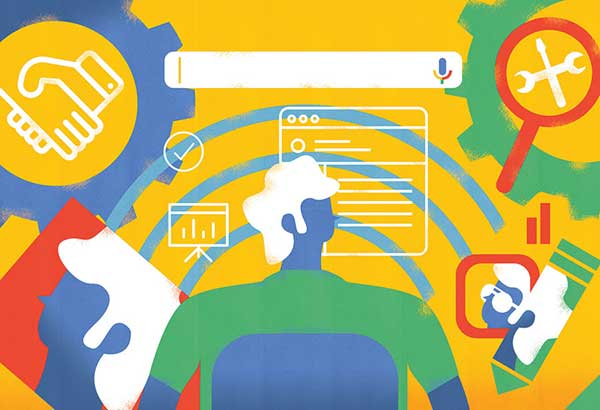The search is over

Art by Gian Nicdao
MANILA, Philippines — There’s something strangely overwhelming about the internet. While initially meant as a way to share data, it’s become much more than that. There is, after all, a lot to be said in an age where “Google” has become a ubiquitous verb instead of a proper noun. It’s always interesting to note how the ways we use the internet reflect on who we are as people, and how the little things can actually mean a lot. Young STAR sat down with Geia Lopez, Google PH’s industry expert, to talk about Filipino millennials’ online behavior, and what it means for us as a generation.
We want faster access to information.
“What defines this generation will set the tone for the generation after it,” says Geia. And when it comes to millennials, access is key. Smartphone penetration is at 30 percent among Pinoys, and with the internet, the world has collapsed into bytes and bytes of data – to the point that it becomes easier to access information that would’ve taken hours to access in a library. Getting quick and easy access has not just become a millennial premium, but also a way of adapting to the world.
While the internet has its fair share of problems, there’s no doubt it’s revolutionized the way we do things, regardless of generation. But because we’ve picked up on it at an earlier age, we’ve had more time to understand it and find ways to use it more efficiently. And in a landscape that’s been ultimately shaped by it, this technological savvy has its fair share of perks and responsibilities.
We use the internet to help define ourselves.
With most of us within the 20s-to-30s age range, we’re a generation in flux, still trying to process the transition while searching for identity. Navigating this period can be a little tricky in the real world, but with the internet, there’s suddenly an easier, less judgmental way to explore your inner questions and pursuits. According to Geia, 75 percent of millennials state that the internet is the first place they go to for information. “Everyone tells the truth on a search bar,” after all, and it’s not hard to see why — unlike life, you’re sure to find the answers you need with a search bar, cementing an unspoken relationship of trust between you and the engine.
With the vastness of the internet, you’re sure to find sites that cater to your interests and queries. Have questions about your sexuality? There’s probably a forum about that. Want to express your artistic side? There’s a bunch of online platforms for that. The thought can remind us a little bit of Black Mirror, sure, but on the upside you are free to explore the potential of your being, unlocking it as you go along. The best part? The internet experience is what you make of it. And in a world of uncertainty, that brings a sense of relief.
We like to find things on our own.
While it’s common practice to ask other people for help, 66 percent of people actually form decisions online using search engines, and 57 percent watch online videos to learn something new. And in the spirit of healthy cynicism (no doubt also spurred by the internet age), searching for answers becomes a sort of fail-safe, a way of finding out if the information you’ve been given is true or not.
We prefer experiences over things.
With 19 percent search growth for travel and tourism categories during the second quarter of 2017 and 25 percent search growth for restaurants, a lot of millennial online behavior leans towards experience-based searches, as opposed to products and services. At times, this can delve into personal territory: if you had limited resources, what would you spend them on? The more you think about it, the more it begins to look like a question of values as much as our priorities.
There’s a New York Times article about how millennials actually seek meaningfulness as opposed to financial success, particularly when talking about career paths. But this isn’t just limited to that aspect; the search for meaning is deeply rooted in the millennial psyche. It’s no wonder, then, that we prefer rich experiences to material possessions — after all, it’s the experiences we go through that will constitute the lives we live.
We aspire to be makers.
Among the many things the internet has revolutionized, entertainment is one aspect that seems to have changed the most. The Global Web Index estimates that 47 percent of Filipino millennials watch little to no TV, as more are looking at other platforms for their entertainment and inspiration. Most previous modes of entertainment relied on one-way communication, with consumers playing the observer rather than being allowed to actively take part. With the internet, however, viewers gain a more active role, choosing and customizing how and what to enjoy.
But more importantly, it’s also become an avenue to encourage others to make their own content to share, and not just to merely partake in it. Think of the online communities for various creative interests — calligraphers, vloggers, social media influencers, indie filmmakers — and with an upswing of creativity-based online searches, one can see that there’s a drive to not so much consume as there is to create. The raw authenticity in making things and seeing others make things remind us that we still have the capability to make, to create, despite a world that often seems hell-bent on destruction.















